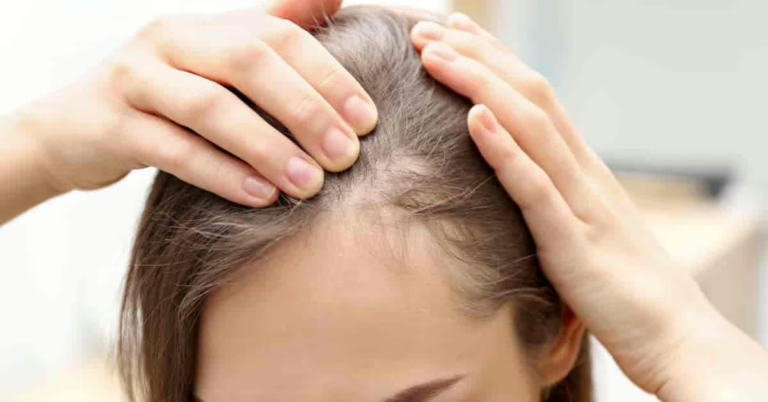How to Use Epsom Salt For Scalp & Hair
Epsom salt, a naturally occurring mineral compound of magnesium sulfate, has gained popularity for its numerous benefits for hair and scalp health. Known for its exfoliating and detoxifying properties, Epsom salt helps cleanse the scalp by removing excess oil, product buildup, and dead skin cells, creating an optimal environment for hair follicles. Its magnesium content also promotes improved blood circulation to the scalp, supporting healthy hair growth while adding volume and texture. Whether used in a scalp scrub or hair treatment, Epsom salt is an affordable and effective solution for maintaining strong, vibrant hair.
The Benefits of Epsom Salt for Your Hair
Epsom salt, widely known for its therapeutic qualities, also offers numerous advantages when it comes to hair care. Here’s how incorporating Epsom salt into your routine can improve the health of your hair
- Natural Cleanser: Epsom salt works as an excellent exfoliator, helping to remove dead skin cells, excess oil, and product residue from the scalp. This deep cleansing action promotes a cleaner, healthier scalp, which is essential for hair growth.
- Enhances Blood Flow: The magnesium in Epsom salt can help improve blood circulation when massaged into the scalp. Improved circulation brings more oxygen and nutrients to the hair follicles, encouraging stronger, healthier hair growth.
- Soothes Scalp Irritation: If you’re dealing with scalp irritation, such as itching or dandruff, Epsom salt can offer relief. Its anti-inflammatory properties help calm irritated skin, while its exfoliating effect clears away flakes and reduces itchiness.
- Boosts Hair Volume and Texture: Epsom salt can enhance the natural volume and texture of your hair. When used in hair treatments or rinses, it lifts the roots and provides fullness without weighing the hair down.
- Balances Oil Production: For those with oily scalps, Epsom salt helps regulate sebum levels. It cleanses excess oil and impurities, leaving the scalp feeling refreshed and preventing greasiness.
Revitalize Hair Growth with Epsom Salt
Epsom salt, a widely recognized natural remedy, utilizes the mineral properties of magnesium sulfate to promote stronger, healthier hair growth. Here’s how Epsom salt can support hair revitalization.
- Epsom salt works as a gentle exfoliator, effectively removing dead skin cells, excess oil, and product buildup from the scalp. By keeping the scalp clean, it creates an optimal environment for hair follicles to thrive, reducing the risk of clogged pores and hair thinning.
- Magnesium, the essential element in Epsom salt, plays a key role in improving blood circulation. When applied to the scalp, it helps widen blood vessels and increases blood flow to hair follicles. This enhanced circulation delivers more oxygen and nutrients to the follicles, promoting hair growth and fortifying the hair shaft.
- The magnesium and sulfate ions in Epsom salt penetrate the hair shaft, delivering essential nourishment and hydration from within. This reduces breakage and brittleness, contributing to the overall health and vitality of your hair.
- Stress is a known factor that can negatively affect hair health and cause hair loss. Epsom salt’s relaxing properties can help alleviate stress when used in baths or hair treatments. By reducing stress levels, Epsom salt indirectly supports healthy hair growth.
- Moreover, Epsom salt detoxifies the scalp by removing toxins, impurities, and excess sebum. This cleansing process helps unclog hair follicles, improves nutrient absorption, and encourages healthier hair growth.
Enhancing Hair Volume and Texture with Epsom Salt
Epsom salt can also be a game-changer when it comes to boosting the volume and texture of your hair. Here’s how it works and how you can use it for added benefits:
- Absorbing Excess Oil: Epsom salt is a natural absorbent, effectively removing excess oil from the scalp and hair strands. This is especially useful for those with oily hair, as it prevents the hair from appearing greasy and weighed down.
- Root Lift: When used in hair treatments or rinses, Epsom salt can add volume by lifting the hair at the roots, giving it a fuller and more voluminous look. This effect is particularly beneficial for people with fine or thin hair, as it adds height and body.
- Adding Texture: Epsom salt also enhances hair texture, making it easier to style and giving it a dynamic appearance. Whether you’re aiming for tousled waves or a casual updo, Epsom salt helps achieve that effortless, textured look.
- Boosting Body and Movement: By removing buildup and excess oil, Epsom salt allows the hair to move naturally, giving it a light, airy feel. This added body and movement create a more voluminous and bouncy appearance.
How Epsom Salt Can Help Dandruff
Epsom salt, primarily made of magnesium sulfate, is beneficial for scalp health. Magnesium helps stimulate cellular turnover by reducing calcium buildup on the scalp, which can lead to dryness, flaking, and hair shedding. Epsom salt also acts as a gentle exfoliator, removing dead skin and dandruff buildup while providing essential nutrients to the scalp.
Dandruff can be a persistent issue, and while there are many shampoos with active ingredients like zinc or selenium to manage flakes, sometimes you need a quick solution without heading to the store. Thankfully, with simple ingredients like Epsom salt, shampoo, and some elbow grease, you can tackle dandruff at home. Here’s what experts recommend for using Epsom salt effectively.
It’s important to distinguish between dandruff and more severe scalp conditions like seborrheic dermatitis or psoriasis. If your scalp is irritated or has cuts, avoid using Epsom salt as it could aggravate the issue. Always consult a dermatologist to determine the root cause of your flakes before trying any at-home remedies.
How to Use Epsom Salt for Dandruff Relief
Ingredients
To make your own dandruff treatment, mix half a teaspoon of Epsom salt with three teaspoons of avocado oil or shea butter. This helps to moisturize and protect the scalp from the drying effects of the salt.
Step-by-Step Instructions
1. Apply a few tablespoons of Epsom salt to your dry or slightly damp scalp.
2. Massage gently for two to three minutes to exfoliate the scalp.
3. Let the mixture sit for another two to three minutes.
4. Rinse, then follow with a gentle, moisturizing shampoo.
5. Repeat this treatment once or twice a week, depending on the severity of your dandruff.
How Often to Use This Treatment
You can perform this treatment up to twice a week. For long-term dandruff management, it’s recommended to alternate between products containing different active ingredients to ensure your scalp stays flake-free.
Scalp Care Tip: Let your shampoo sit on the scalp for a few minutes before rinsing to maximize its effect. Also, protect your scalp with a scarf when exposed to the sun, as sunburn can exacerbate dandruff.
Is Epsom Salt Suitable for All Hair Types?
While Epsom salt can benefit those with fine, oily hair by adding volume, it can be drying for other hair types, especially curly or thicker textures. If your hair tends to be dry, it’s a good idea to pretreat the ends with a nourishing oil before applying Epsom salt to your scalp.
Epsom salt can be a convenient and cost-effective solution for managing dandruff. However, ensure you’re using it with the proper conditioning and protective products to avoid drying out your scalp or hair. For more persistent dandruff, it’s always best to consult a dermatologist for professional guidance and tailored treatment. Including nourishing essential oils like peppermint, rosemary, or tea tree into your scalp care routine can further enhance circulation, promoting a healthy scalp environment. Remember, scalp care is just as essential as hair care for long-term hair health.







